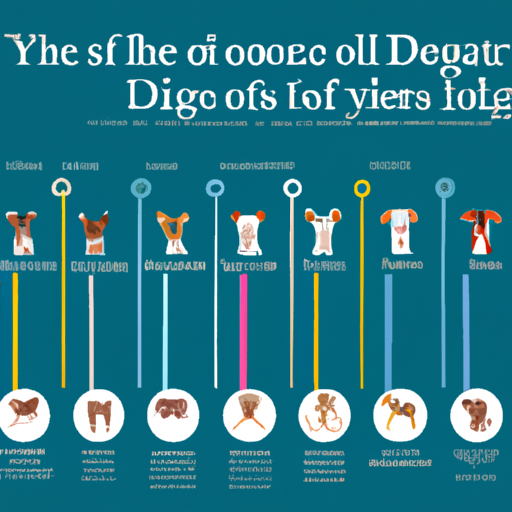Understanding Your Dog’s Age
You have always heard that one dog year equals seven human years, right? But this isn’t entirely accurate. The ratio is not as straightforward as this. As a caregiver, it’s important for you to understand that your dog’s breed, size, and overall health play a significant role in how quickly they age.
To put it in perspective, a one-year-old dog is similar to a 15-year-old human. By the time they turn two, they’re akin to a 24-year-old human. Every dog year afterward equals approximately four to five human years.
Factors That Affect Your Dog’s Aging Process
Many factors can affect how your dog ages. Let’s delve into them:
-
Size and Breed: Generally, smaller breeds tend to live longer than larger breeds. For example, a Chihuahua may live up to 15 years, while a Great Dane may only live up to 8 years.
-
Diet and Exercise: Proper nutrition and regular physical activities can keep your dog healthy, thus slowing the aging process.
-
Genetics: Some breeds are predisposed to certain health conditions that can affect their lifespan.
The Dog Aging Chart
Here is a general guideline to understanding the aging process of dogs in human years:
| Dog’s Age | Small Breeds | Medium Breeds | Large Breeds |
|---|---|---|---|
| 1 year | 15 years | 15 years | 15 years |
| 2 years | 24 years | 24 years | 24 years |
| 3 years | 28 years | 28 years | 28 years |
| 4 years | 32 years | 32 years | 32 years |
| 5 years | 36 years | 36 years | 36 years |
| 6 years | 40 years | 42 years | 45 years |
| 7 years | 44 years | 47 years | 50 years |
| 8 years | 48 years | 51 years | 55 years |
Caring for Your Aging Dog
As you navigate this journey with your beloved pet, consider these points:
- Regular vet check-ups: Regular vet visits are important to catch any potential health problems early.
- Diet and exercise: Maintain a balanced diet and regular exercise routine for your dog.
- Mental stimulation: Keep your dog’s mind sharp with toys, puzzles, and regular interaction with you.
FAQ’s
Q: Is the 7:1 dog to human year ratio accurate?
A: No, this is a myth. The aging process is more complex and depends on factors like breed and size.
Q: Do small dogs live longer?
A: Generally, yes. Smaller breeds tend to live longer than larger breeds.
Q: How can I prolong my dog’s life?
A: Regular vet check-ups, a balanced diet, regular exercise, and mental stimulation can contribute to a longer, healthier life for your dog.
Remember, every dog is unique and may age differently. As a caregiver, your love and care can make a significant difference in their lives.



